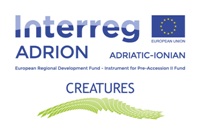 The project “Promoting Creative Tourism through new Experiential and Sustainable Routes (CREATURES)” (2020-2023) is funded by the European interregional cooperation programme Interreg ADRION through the European Regional Development Fund (ERDF) and national funds. CREATURES aims to strengthen the link between Cultural and Creative Sectors (CCS) and the tourism industry in the participating regions and to increase their contribution to the regions’ sustainable development by developing new tourist routes that incorporate the regions’ cultural heritage and promoting them with the use of new technologies.
The project “Promoting Creative Tourism through new Experiential and Sustainable Routes (CREATURES)” (2020-2023) is funded by the European interregional cooperation programme Interreg ADRION through the European Regional Development Fund (ERDF) and national funds. CREATURES aims to strengthen the link between Cultural and Creative Sectors (CCS) and the tourism industry in the participating regions and to increase their contribution to the regions’ sustainable development by developing new tourist routes that incorporate the regions’ cultural heritage and promoting them with the use of new technologies.
The project is coordinated by the Metropolitan City of Bologna (Italy) with the participation of: Friuli Venezia Giulia Autonomous Region (Italy), Urban Planning Institute of the Republic of Slovenia (Slovenia), Patras Science Park (Greece), Regional Development Agency Dubrovnik-Neretva County (Croatia), Regional Directorate of Cultural Heritage – Vlora (Albania) and School of Economics and Business in Sarajevo, University of Sarajevo (Bosnia and Herzegovina). The Scientific Responsible of CREATURES for the Athens University of Economics and Business is Eleni Apospori, Associate Professor of the Department of Marketing and Communication.
The project has produced the following results:
- Development and pilot implementation of new sustainable and creative cultural and tourist routes in the participating regions. Project partners developed and are piloting 14 new cultural and tourist routes. These routes provide tourists with the opportunity to explore points of interest that are related to the local historic and cultural heritage, the natural environment, the local architectural heritage as well as music, theatre and literature. The routes incorporate sustainable modes of transportation, such as biking and hiking.
The 14 new sustainable and creative cultural and tourist routes that the project partners developed are:
- “Bicycle Route” and “Creativity Network” in the Region of Western Greece,
- “Piccola Cassia (Bologna-Bazzano)” and “Piccola Cassia (Bombiana – Porretta Terme)” in the region Emilia-Romagna (Italy),
- “Literary Route” and “Musical Route” in the region Friuli-Venezia Giulia (Italy),
- “Eat, Pray, Love” and “From East to West” in the city of Sarajevo (Bosnia and Herzegovina),
- “The story of a young soldier on the Soča river (Isonzo) WW1 fr’nt” and “Wherever the–river flows, that's where I want to be - Bridges and embankments of the Ljubljanica river” in Slovenia,
- “LIBERTAS Perspective” and “LIBERTAS Horizon” in the region Dubrovnik-Neretva (Croatia), and
- “Spinarica” ans “Julius Cesar” in the region of Vlore (Albania).
More details on the new sustainable and creative cultural and tourist routes can be found in the dedicated webpage developed by the project: http://portal.creatoures.eu.
- Development of applications for the new routes with the use of new technologies. To promote the new cultural and tourist routes, CREATURES develops a smartphone app and multimedia installations. The smartphone app provides tourists with the capability to personalise the route that they wish to follow, taking into consideration the length of their stay in the region and their specific interests (e.g., history, architecture, gastronomy).
The multimedia installations have been or will be installed in specific points of the tourist routes and will provide information to tourists on the cultural characteristics and points of interests of the routes.
- Good Practices on how the CCS can contribute to the promotion of cultural heritage and sustainable tourism in the participating regions in a creative way. The 27 Good practices that were identified and described by the project partners include services that:
- Incorporate new technologies for the promotion of cultural heritage. Examples of such Good Practices include:
- The “Talking Map of Aquileia” (Italy), which promotes the cultural heritage of the Aquileia (a UNESCO World Heritage Site) through multimedia applications.
- The three-dimensional (3D) interactive presentation of the restoration and conservation of the altar of the church of St. Jerome in the town of Slano (Croatia).
- Bring the cultural heritage of a region closer to the visitors through the organisation of events. Examples of such Good Practices include:
- The Pordenonelegge Literature Festival (Italy)
- The Olympia International Film Festival for Children and Young People (Greece).
- Incorporate the active participation of visitors in the exploration of cultural heritage. Examples of such Good Practices include:
- The thematic route “Pelješac – The Empire of Wine” (Croatia), which offers visitors experiences of agrotourism and wine-tasting.
- The Royal City of Vranduk (Bosnia and Herzegovina), which showcases local gastronomy and traditional crafts such as carpet weaving.
- Offer visitors the opportunity to tour the natural, historic or cultural heritage of a region. Examples of such Good Practices include:
- Thematic tours related to polyphonic music in South Albania.
- The “Bike Slovenia Green” bicycle tours that connect tourist destinations awarded with the environmental certificate “Slovenia Green” (Slovenia).
More information on the Good Practices are available in the E-Catalogue on Good Practices that the project has developed and which is available on the project website: https://creatures.adrioninterreg.eu/library/good-practices-e-catalogue.
- Policy recommendations for the development and sustainability of CCS in the participating regions and tools for their implementation. The policy recommendations and tools are addressed to the organisations responsible for the development and implementation of policies on regional development and sustainability.
More information on the recommendations and policy tools are available in the relevant report on the project website: https://creatures.adrioninterreg.eu/library/creatures-policy-recommendations.
- Support to companies operating in the CCS to strengthen their capabilities. The participating regions developed and implemented training and mentoring programs for CCS companies, which aimed to increase their capacity on topics related to the development of business plans, marketing and promotion of CCS products and services, and promotion of business ideas for securing funding (pitching, fundraising). Mentoring activities involved the provision of personalised support to the CCS companies by experts in the respective fields.
More information on the companies support program are available in the relevant report on the project website: https://creatures.adrioninterreg.eu/library/final-report-on-the-results-of-japs-implementation.
In the framework of CREATURES, the Athens University of Economics and Business team developed the project methodology. The goal of the methodology is to assist partners in mapping the current situation of CCS in their regions and identifying existing opportunities, threats, strengths and weaknesses for the CCS sector, identifying and collecting Good Practices in the promotion of cultural heritage and development of tourist products that partner regions have developed and implemented, developing policy recommendations for the support and strengthening of CCS in the regions, and evaluating the training and mentoring programmes offered by the regions.
Website: https://creatures.adrioninterreg.eu/
Facebook: https://www.facebook.com/CreaturesProject
Twitter: https://twitter.com/CreaturesProje2
Instagram: https://www.instagram.com/creatures_project/
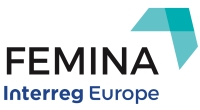 The project FEMINA is funded by the European interregional cooperation program Interreg Europe through the European Regional Development Fund (ERDF), and national resources. Scientific Project Manager for the Athens University of Economics and Business is Associate Professor Eleni Apostori.
The project FEMINA is funded by the European interregional cooperation program Interreg Europe through the European Regional Development Fund (ERDF), and national resources. Scientific Project Manager for the Athens University of Economics and Business is Associate Professor Eleni Apostori.
The aim of FEMINA project is the cooperation between regional partners to integrate into regional economic development policies measures to promote female entrepreneurship and women's participation in high-tech sectrors, in the Smart Specialization Strategy (S3) of each region.
Website: https://www.interregeurope.eu/femina/
Facebook: FEMINA-Interreg project
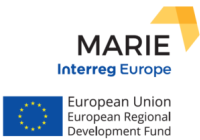 The aim of the MARIE project is to introduce the concept of Responsible Research and Innovation (RRI) into regional policy measures that enhance the innovative economic development of the regions within the framework of the Smart Specialization Strategy pillars S3) of each region. The RRI concept encourages the cooperation of social, academic, business and partner and policy actors to better connect and align business innovation and research activity and its outcomes with the needs, values and expectations of the society it affects.
The aim of the MARIE project is to introduce the concept of Responsible Research and Innovation (RRI) into regional policy measures that enhance the innovative economic development of the regions within the framework of the Smart Specialization Strategy pillars S3) of each region. The RRI concept encourages the cooperation of social, academic, business and partner and policy actors to better connect and align business innovation and research activity and its outcomes with the needs, values and expectations of the society it affects.
Website: https://www.interregeurope.eu/marie/
Twitter: @MARIEinterreg
Facebook: MARIEinterreg
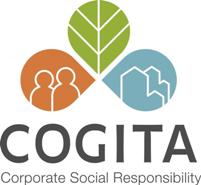
The COGITA project intends to identify and implement tools that public authorities and other public stakeholders can adopt in their regional economic policy, in order to promote an approach that combines social and environmental responsibility in SME support. Within this integrated concept, COGITA considers 5 sub-themes: raising CSR awareness and capacity; CSR in public procurement; CSR criteria in public funding; inter-firm collaboration and local supply chains; communication/ branding.
COGITA will combine interregional exchange with local stakeholder involvement, in order to ensure that the project is in line with local priorities. The project will support regional development with tools that promote CSR as a tool for competitiveness, growth and more and better jobs in our SMEs. The COGITA project is co-financed by the ERDF and made possible by the INTERREG IVC programme.
Press Release
COGITA Brochure
COGITA Newsletter
Funded by the European Commission, Directorate-General for Communications Networks, Content and Technology (DG CONNECT) (2014-2016).
 The objective of the R-ICT project is to develop a thematic network to coordinate CSR in the area of Information and Communication Technologies (ICT) in the European Union in order to encourage the relevant enterprises to implement and promote CSR through strategic partnerships with relevant stakeholders on the basis of relevant good practices. The R-ICT project is relevant to the European Union ICT Policy Support Program (ICT-PSP) and contributes to the implementation of the Digital Agenda for Europe (DAE) through the promotion of digital technologies in CSR, the implementation of CSR practices in the area of ICT, tackling the barriers to the spread of CSR in the ICT sector and the active participation of SMEs.
The objective of the R-ICT project is to develop a thematic network to coordinate CSR in the area of Information and Communication Technologies (ICT) in the European Union in order to encourage the relevant enterprises to implement and promote CSR through strategic partnerships with relevant stakeholders on the basis of relevant good practices. The R-ICT project is relevant to the European Union ICT Policy Support Program (ICT-PSP) and contributes to the implementation of the Digital Agenda for Europe (DAE) through the promotion of digital technologies in CSR, the implementation of CSR practices in the area of ICT, tackling the barriers to the spread of CSR in the ICT sector and the active participation of SMEs.
Website: www.r-ict.eu
Facebook: Responsible ICT
Twitter: @ResponsibleICT
Local policies for responsible development in Mediterranean countries
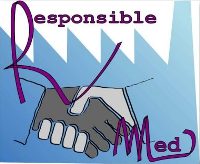 Professor Eleni Apospori is the scientific coordinator for Greece for the European Med Program funded by the European Commission.
Professor Eleni Apospori is the scientific coordinator for Greece for the European Med Program funded by the European Commission.
Program Information
SERMANTEQ - Revamping academic educational programs for the Mediterranean countries.
European Business-to-Business Sales Institute: Development of an e-learning training program for sales executives.
Study the effects of electronic commerce on small and medium sized companies.
Redesigning university education in Moldova.
Study the effects of multimedia on advertising.
ODILE: Study the feasibility of open and distance learning in Greece.



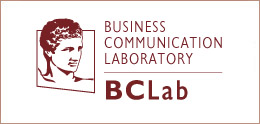
 The project “Promoting Creative Tourism through new Experiential and Sustainable Routes (CREATURES)” (2020-2023) is funded by the European interregional cooperation programme Interreg ADRION through the European Regional Development Fund (ERDF) and national funds. CREATURES aims to strengthen the link between Cultural and Creative Sectors (CCS) and the tourism industry in the participating regions and to increase their contribution to the regions’ sustainable development by developing new tourist routes that incorporate the regions’ cultural heritage and promoting them with the use of new technologies.
The project “Promoting Creative Tourism through new Experiential and Sustainable Routes (CREATURES)” (2020-2023) is funded by the European interregional cooperation programme Interreg ADRION through the European Regional Development Fund (ERDF) and national funds. CREATURES aims to strengthen the link between Cultural and Creative Sectors (CCS) and the tourism industry in the participating regions and to increase their contribution to the regions’ sustainable development by developing new tourist routes that incorporate the regions’ cultural heritage and promoting them with the use of new technologies. The project FEMINA is funded by the European interregional cooperation program Interreg Europe through the European Regional Development Fund (ERDF), and national resources. Scientific Project Manager for the Athens University of Economics and Business is Associate Professor Eleni Apostori.
The project FEMINA is funded by the European interregional cooperation program Interreg Europe through the European Regional Development Fund (ERDF), and national resources. Scientific Project Manager for the Athens University of Economics and Business is Associate Professor Eleni Apostori.


 Professor Eleni Apospori is the scientific coordinator for Greece for the European Med Program funded by the European Commission.
Professor Eleni Apospori is the scientific coordinator for Greece for the European Med Program funded by the European Commission. 12 Derigni Str., 4th floor
12 Derigni Str., 4th floor +30 210 8203433
+30 210 8203433
